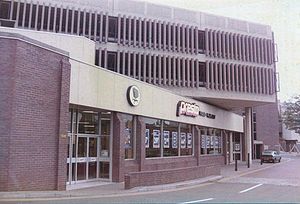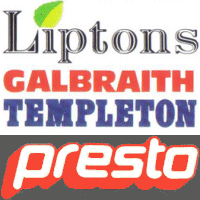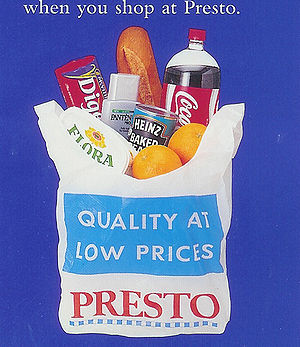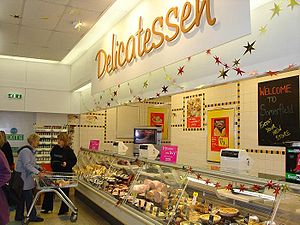.gif)
Presto (UK Supermarket)
Encyclopedia

Supermarket
A supermarket, a form of grocery store, is a self-service store offering a wide variety of food and household merchandise, organized into departments...
s and convenience store
Convenience store
A convenience store, corner store, corner shop, commonly called a bodega in Spanish-speaking areas of the United States, is a small store or shop in a built up area that stocks a range of everyday items such as groceries, toiletries, alcoholic and soft drinks, and may also offer money order and...
s in Great Britain
Great Britain
Great Britain or Britain is an island situated to the northwest of Continental Europe. It is the ninth largest island in the world, and the largest European island, as well as the largest of the British Isles...
. The brand finally disappeared during 1998.
Presto Foodmarkets
The company was established in the north of EnglandEngland
England is a country that is part of the United Kingdom. It shares land borders with Scotland to the north and Wales to the west; the Irish Sea is to the north west, the Celtic Sea to the south west, with the North Sea to the east and the English Channel to the south separating it from continental...
and in Scotland
Scotland
Scotland is a country that is part of the United Kingdom. Occupying the northern third of the island of Great Britain, it shares a border with England to the south and is bounded by the North Sea to the east, the Atlantic Ocean to the north and west, and the North Channel and Irish Sea to the...
in 1977 where its primary base remained but for some years Presto did have a nationwide presence. According to the Institute of Grocery Distribution the name derives from the town of Prestonpans
Prestonpans
Prestonpans is a small town to the east of Edinburgh, Scotland, in the unitary council area of East Lothian. It has a population of 7,153 . It is the site of the 1745 Battle of Prestonpans, and has a history dating back to the 11th century...
, the location in which the first Presto store was opened. A store also opened around the same time in Preston Grange, Tyne and Wear.
Allied Suppliers
Presto was a division of Allied SuppliersHome and Colonial Stores
Home & Colonial Stores was once one of the United Kingdom's largest retail chains. Its formation of a vast chain of retail stores in the late 1920s is seen as the first step in the development of a UK food retail market dominated by a small number of food multiples.-History:The business was founded...
which also operated 500 Liptons supermarkets in England and Wales as well as the brands Galbraith and Templeton with around 85 supermarkets in Scotland. Allied also operated a discount chain, Lo-Cost as well as Cordon Bleu, a chain of freezer centres. Presto was the most significant brand, operating primarily large supermarkets and superstores throughout the country.
In 1982, Presto and its 136 stores transferred, together with the rest of Allied Suppliers to Argyll Foods
Argyll Foods
Argyll Foods plc was a large supermarket operator in the United Kingdom. In 1987 it acquired Safeway Inc.'s UK subsidiary and in 1996 it changed its name to Safeway plc.-Early years:...
Ltd. Allied Suppliers was sold by its then owner James Goldsmith
James Goldsmith
Sir James Michael "Jimmy" Goldsmith was an Anglo-French billionaire financier and tycoon. Towards the end of his life, he became a magazine publisher and a politician. In 1994, he was elected to represent France as a Member of the European Parliament and he subsequently founded the short-lived...
for £101 million.
Argyll

Hintons
Hintons plc was a small supermarket chain from the North of England, bought out in a takeover by Argyll Foods in 1984.-History:The Company was founded by Amos Hinton in Middlesbrough in 1871 when he bought out John Birks' shop in South Street. By 1919 the business had expanded such that it had...
plc which operated 55 supermarkets under the Hintons name in the North East of England, Cumbria
Cumbria
Cumbria , is a non-metropolitan county in North West England. The county and Cumbria County Council, its local authority, came into existence in 1974 after the passage of the Local Government Act 1972. Cumbria's largest settlement and county town is Carlisle. It consists of six districts, and in...
and Yorkshire
Yorkshire
Yorkshire is a historic county of northern England and the largest in the United Kingdom. Because of its great size in comparison to other English counties, functions have been increasingly undertaken over time by its subdivisions, which have also been subject to periodic reform...
. Although the Hintons name remained above the door, Hintons' own brand products were quickly replaced with Presto brands as well as Argyll's "Basics" low price brand.
The new Hintons store in Guisborough (today a Morrisons) was one of the last to be launched with the Hintons name, the interior of the store having already been fitted out in the Presto standard.

Argyll also launched a new slogan in 1985 moving from "for the best, best go to Presto" to "You'll be impressed in Presto". To complement the new slogan, a new logo was also launched featuring yellow, blue and red as well as, for a short time, a shopping basket. The new logo was used on all converted stores while original Presto stores retained the old logo on their exterior signage throughout their life. A number of new Presto Superstores were also opened featuring the new logo.
In 1986, the conversion programme was complete and Argyll was set for expansion and new Presto regional distribution centres in Bristol
Bristol
Bristol is a city, unitary authority area and ceremonial county in South West England, with an estimated population of 433,100 for the unitary authority in 2009, and a surrounding Larger Urban Zone with an estimated 1,070,000 residents in 2007...
, Wakefield
Wakefield
Wakefield is the main settlement and administrative centre of the City of Wakefield, a metropolitan district of West Yorkshire, England. Located by the River Calder on the eastern edge of the Pennines, the urban area is and had a population of 76,886 in 2001....
, Bathgate
Bathgate
Bathgate is a town in West Lothian, Scotland, on the M8 motorway west of Livingston. Nearby towns are Blackburn, Armadale, Whitburn, Livingston, and Linlithgow. Edinburgh Airport is away...
and Welwyn Garden City
Welwyn Garden City
-Economy:Ever since its inception as garden city, Welwyn Garden City has attracted a strong commercial base with several designated employment areas. Among the companies trading in the town are:*Air Link Systems*Baxter*British Lead Mills*Carl Zeiss...
were planned.
Safeway - Phase 1

Safeway (UK)
Safeway was a chain of supermarkets and convenience stores in the United Kingdom. It started as a subsidiary of the American Safeway Inc., before being sold off in 1987....
. Seven Presto stores were converted to Safeway on a trial basis including the Presto Superstores at Farnham, Morden and Chandlers Wharf, Stockton-On-Tees (today a Bingo hall and Casino). In 1988 a further 57 Presto stores (including the store at Sedgley
Sedgley
Sedgley is an urban village within the West Midlands county of England. Historically a part of Staffordshire, Sedgley was formerly an ancient manor composed of several smaller villages, including Gornal, Gospel End, Woodsetton, Ettingshall, Coseley and Brierley...
, West Midlands
West Midlands (county)
The West Midlands is a metropolitan county in western central England with a 2009 estimated population of 2,638,700. It came into existence as a metropolitan county in 1974 after the passage of the Local Government Act 1972, formed from parts of Staffordshire, Worcestershire and Warwickshire. The...
, which had opened only a year earlier) changed to Safeway and Argyll began phasing out Presto's own brand range, replacing it with the Safeway own-brands throughout the estate. Some Presto brands remained however, pre-packed bread continued to be sold as a Presto own brand in Presto stores.
As time went by most of Presto's larger stores were converted to Safeway. However, the Presto name continued to be used on supermarkets and smaller stores in the North East of England and Scotland. No new Presto stores opened during this period as Argyll concentrated on opening larger stores.
Revival

Safeway - Phase 2
In 1996 Argyll announced it was changing its name to Safeway and would be converting the remaining 110 Presto stores to Safeway.

